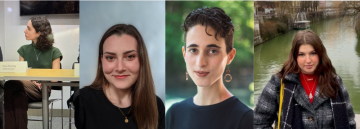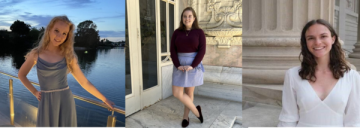Essay Prizes
In Spring 2022, REEESNe first instituted its three essay competitions, for which we award the Marina Ledkovsky Prize for best short-form paper submitted by a student at either the undergraduate or the Master’s level, the Ambassador Carlos Pascual Prize for best long-form essay submitted by a Master’s student, and the James Billington Prize for best long-form essay submitted by an undergraduate student.
To submit your essay (maximum of one entry in each category for which you qualify), please follow the guidelines below and email your file to ian.macmillen@yale.edu by 11:59 pm Eastern on May 31st, 2024.
The competitions:
- The Marina Ledkovsky Prize: For short-form writing on REEES topics of at least 1,000 words but fewer than 3,000 words (including all appendices, but NOT including bibliographical materials or footnotes/endnotes, which may be counted separately). The competition is open to both undergraduate- and Master’s-level writing, as well as to essays written for scholarly as well as public audiences.
- The Carlos Pascual Prize and the James Billington Prize: For long-form, scholarly writing on REEES topics of at least 3,000 words but fewer than 9,000 words (including all appendices, but NOT including bibliographical materials or footnotes/endnotes, which may be counted separately). These are two separate competitions for MA- and undergraduate-level writing; in each case, the essay should be aimed at an academic audience.
Student eligibility: Entrants must be current students at REEESNe member institutions OR must have been enrolled at one in the 24 months prior to the competition deadline of May 31st, 2023. Students who have graduated within the past two years and have not moved on to a higher level of education during that time (i.e. who have not enrolled in a Master’s program in the case of Associate/Bachelor’s graduates, or in a doctoral program in the case of Master’s graduates) may submit to the competitions that match their most recent studies. Students who have advanced to doctoral candidacy are not eligible for these competitions. We encourage speakers from the REEESNe Student Conference to submit their revised papers, but participation there is not a prerequisite for the competition.
Essays requirements: Each entry must be the REEES-related work (in English) of a single student author and must be submitted by that author. REEES-related work from any discipline is eligible. There is no restriction on when the essay was written, but students may not submit work currently or previously considered for another REEESNe competition. For long-form essays, students’ writing will be evaluated in the competition for which they are eligible based on their current level of study. Students may only enter one essay in each competition but may, in the same year, enter separate essays in the long-form competition for which they are eligible and in the single short-form competition.
2022-23 Prize Announcement
We are delighted to announce the 2022-23 winners and runners-up for each competition, who along with the awards received cash prizes. We are also happy to have the chance to share some information about the dedicatees for whom the prizes are named, each of whom has had a stellar career reaching beyond academia after receiving one or more degrees from an institution that is now a part of the REEESNe network.
2022-2023 Prize Winners, left to right: Nora Furlong, Diana Gor, Hilah Kohen, and Alice Volfson (photographs by Jack La Piana, Diana Gor, Gabbie Law, and Josh Hughes)
The Marina Ledkovsky Prize for best short-form essay by an undergraduate or Master’s student honors a well-loved professor of Russian language and literature. Long respected as a Turgenev scholar, Dr. Ledkovsky (1924-2014) received her PhD at Columbia University and subsequently taught there and at Barnard College, while her work within and about the Russian Orthodox Church and her editing in collaboration with Charlotte Rosenthal and Mary Zirin of the influential Dictionary of Russian Women Writers (Greenwood, 1994) put her knowledge to significant use beyond academia, demonstrating the impact that short, targeted, well-evidenced writing can have on public understandings of arts and institutions. This year’s Ledkovsky Prize went to two winners: Diana Gor, a recent graduate of Hunter College, whose essay “The Townspeople as the ‘Cultural Body’ of Totalitarianism in Evgeny Shvarts’ The Dragon” is a highly polished and convincing close reading of Shvarts’s play that balances engagement of existing scholarship with interpretation of passages from the play while taking different stagings into consideration to make an original argument about the complacency of the townspeople onstage; and Alice Volfson, a graduating senior at Connecticut College, whose thesis chapter “The Migration of Black Americans to the Soviet Union in the Interwar Period: The Communist International and the ‘Negro Question’” stands alone as both a deep dive into the historical arguments of emerging scholarship and, in the span of a few pages, as an introduction that unpacks ample and valuable content gleaned through original work in archives (with microfiche, no less!). Honorable mention goes to Hunter College’s Nicole Gonik for the essay “‘Every man must have somewhere to go’: Movement in Tolstoy’s War and Peace and Dostoevsky’s Crime and Punishment.”
The Carlos Pascual Prize for best long-form essay by a Master’s student is named for the former U.S. Ambassador to Ukraine (2000-2003) and to Mexico (2009-2011). The career that Ambassador Pascual built following his Master’s degree from Harvard, his work in several State Department positions relating to Europe and Eurasia, and the research and communications initiatives that he oversaw to authenticate the tapes of then-president of Ukraine Leonid Kuchma all speak to the ambitions, vision, skills, and dedication that REEESNe seeks to help its member institutions to cultivate and reward in their Master’s students. The winner of this year’s Pascual Prize is the University of Pennsylvania’s Hilah Kohen, whose essay “From Juhuri to Gĩkũyũ: The Global Circulation of Language Choice in the Soviet Era” introduces a refreshing and compelling theory of circulation that accounts for the worldwide impact of texts that, although they do not travel as text products, nonetheless affect literary worlds outside of their immediate (linguistically constrained) circles. Focusing on Juhuri (Judeo-Tat) texts and the writer Khizgil Avshalumov, whose influence is belied by his small Juhuri-literate public, the essay asserts the importance of tracing literary circulation in the face of world lit. critics and empirically verifiable, yet factually obscuring, accounts of the imperial suppression of minor literatures. Honorable mention goes to Columbia University’s Elise Schlecht for the essay “Outliving Obsolescence: Longevity, Ideology, and Style in Soviet Mass Housing.”
The James Billington Prize for best long-form essay by an undergraduate student is dedicated to the United States’ 13th Librarian of Congress (1987-2015). A widely published historian of Russia, prior to heading the Library of Congress Dr. Billington (1929-2018) received degrees from Princeton University and the University of Oxford, taught at Princeton and Harvard University, and directed the Woodrow Wilson International Center for Scholars, where he founded the Kennan Institute for Advanced Russian Studies. This year’s Billington Prize was shared by two students: Nora Furlong of Bard College, whose essay “The Poet Won’t Die: Authorial Death in Varlam Shalamov’s Kolyma Tales” is to be celebrated for its incisive close readings and impressive engagement with secondary scholarship; and Connecticut College’s Alice Volfson, whose thesis chapter “The Migration of Black Americans to the Soviet Union in the Interwar Period: Oliver Golden and the Agricultural Group” mobilizes a commendable amount of research in order to make an original argument about African Americans in the USSR. Honorable mention goes to Yale University’s Kathryn Yeager for the essay “Kazakh Internal Opposition to the 1928 Soviet Confiscation Campaign.”
2022-2023 Honorable Mention Recipients, left to right: Nicole Gonik, Elise Schlecht, and Kathryn Yeager (photographs by Victoria Gonik, Linnea Harwell, and Weston Kerekes)
We would like to thank Misha Appeltova, Sibelan Forrester, Cynthia Hooper, Katie Sorensen, and Irina Walsh for serving on the Essay Competition Organizational Group and as judges for the three competitions.
Announcements of awards from years past may be accessed here:

